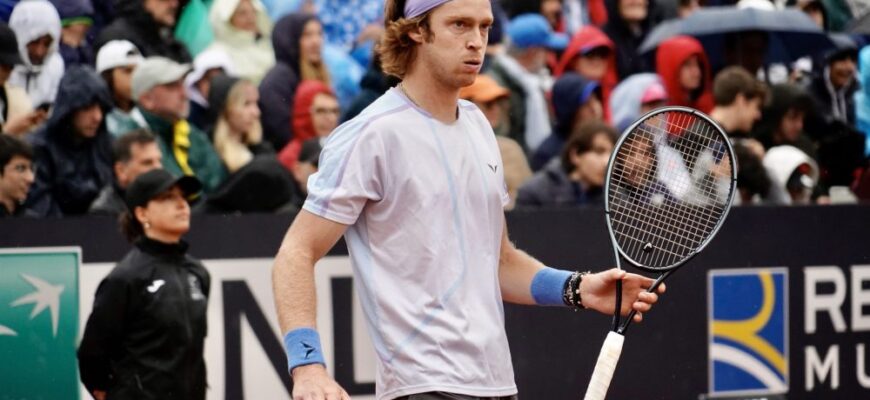Professional tennis is a relentless pursuit of perfection, a sport where the margins between good and truly great are razor-thin. For many players, reaching the upper echelons of the ATP Tour, say, within the Top 20, is a monumental achievement. Yet, for those with higher aspirations, this very position can feel like a ceiling. This is precisely the sentiment recently articulated by Andrey Rublev, the fiery 27-year-old talent, who openly voiced his dissatisfaction with his current level, suggesting he`s extracted all he can from his existing approach.
The Mid-Career Plateau: A Common Conundrum
Rublev`s introspection highlights a common, yet often unspoken, challenge in professional sports: the mid-career plateau. A player might possess immense talent, a potent game, and a commendable work ethic, but without continuous evolution, even a top-tier competitor risks stagnation. To hover just outside the very elite – the Grand Slam contenders and consistent Top 10 mainstays – can be frustratingly close, yet miles away in terms of actual achievement. Rublev`s candid admission that he needs “radical change” or risks “just hovering” within the Top 20 is a stark acknowledgment of this universal athletic struggle.
Elena Dementieva`s Perspective: Beyond Mere Volume
Weighing in on Rublev`s situation, former World No. 3 and Olympic gold medalist Elena Dementieva offered valuable insights. Her perspective, rooted in her own illustrious career, underscores the profound commitment required for such a transformation. “To radically change something, you need to work very hard,” Dementieva observed, acknowledging the difficulty of such a path. She commended Rublev`s desire to evolve at 27, noting that “tennis is all about endless analysis, about endless self-improvement.”
Crucially, Dementieva clarified that the solution isn`t simply about increasing training volume. The common assumption is that if one is not improving, one must simply train more. However, as Dementieva suggests, this is often a simplistic view. “I don`t think it`s always about volume,” she stated. “Maybe it`s about changing the training process itself, altering something, perhaps in technique.” This distinction is vital: quality over quantity, strategic adjustment over brute force.
The Nature of `Radical Change` in Tennis
What exactly does “radical change” entail for a player already operating at an elite level? It`s a complex cocktail of adjustments:
- Technical Refinement: Even a slight tweak to a serve motion, forehand grip, or backhand follow-through can unlock new levels of power, consistency, or spin. These are often difficult to implement as they disrupt ingrained muscle memory.
- Strategic Evolution: Developing new shot patterns, improving court positioning, or enhancing net play – moving beyond predictable play can surprise opponents and open up new avenues for victory.
- Physical Conditioning: Tailoring fitness routines to improve specific areas like endurance for five-set matches, explosive power for critical points, or injury prevention.
- Mental Fortitude: Perhaps the most challenging. This involves working with sports psychologists to manage pressure, maintain focus, and develop resilience, especially during Grand Slams.
- Coaching and Support Staff: Sometimes, a fresh perspective from a new coach or specialist can provide the necessary catalyst for change.
Dementieva`s emphasis on “heavy, monotonous, daily work” paints a realistic picture. This isn`t a quick fix or a magical epiphany. It`s the grind, the repetition, the seemingly endless hours on the practice court and in the gym, meticulously chipping away at weaknesses and solidifying strengths. For a player like Rublev, whose game is known for its intensity and power, perhaps the radical change lies in finding more variety, more tactical nuance, or simply a calmer demeanor under pressure.
The Grand Slam Hurdle and Future Prospects
The implied goal behind Rublev`s yearning for change, and Dementieva`s hope for results, particularly at “Australia next year,” points directly to the Grand Slams. Despite his consistent Top 20 presence and numerous ATP titles, Rublev has yet to break through the quarter-final barrier at a major. This is the ultimate benchmark for a player of his caliber, the true test of whether one has transcended from `very good` to `elite`.
Rublev`s honest assessment of his career juncture is not a sign of weakness, but rather a testament to his ambition. The willingness to confront one`s perceived limitations and commit to such arduous self-reinvention is what separates the perennial contenders from those who merely participate. The tennis world will undoubtedly watch with keen interest to see if Andrey Rublev can translate this commendable desire for radical evolution into tangible results, perhaps even achieving the Grand Slam glory he evidently yearns for.







